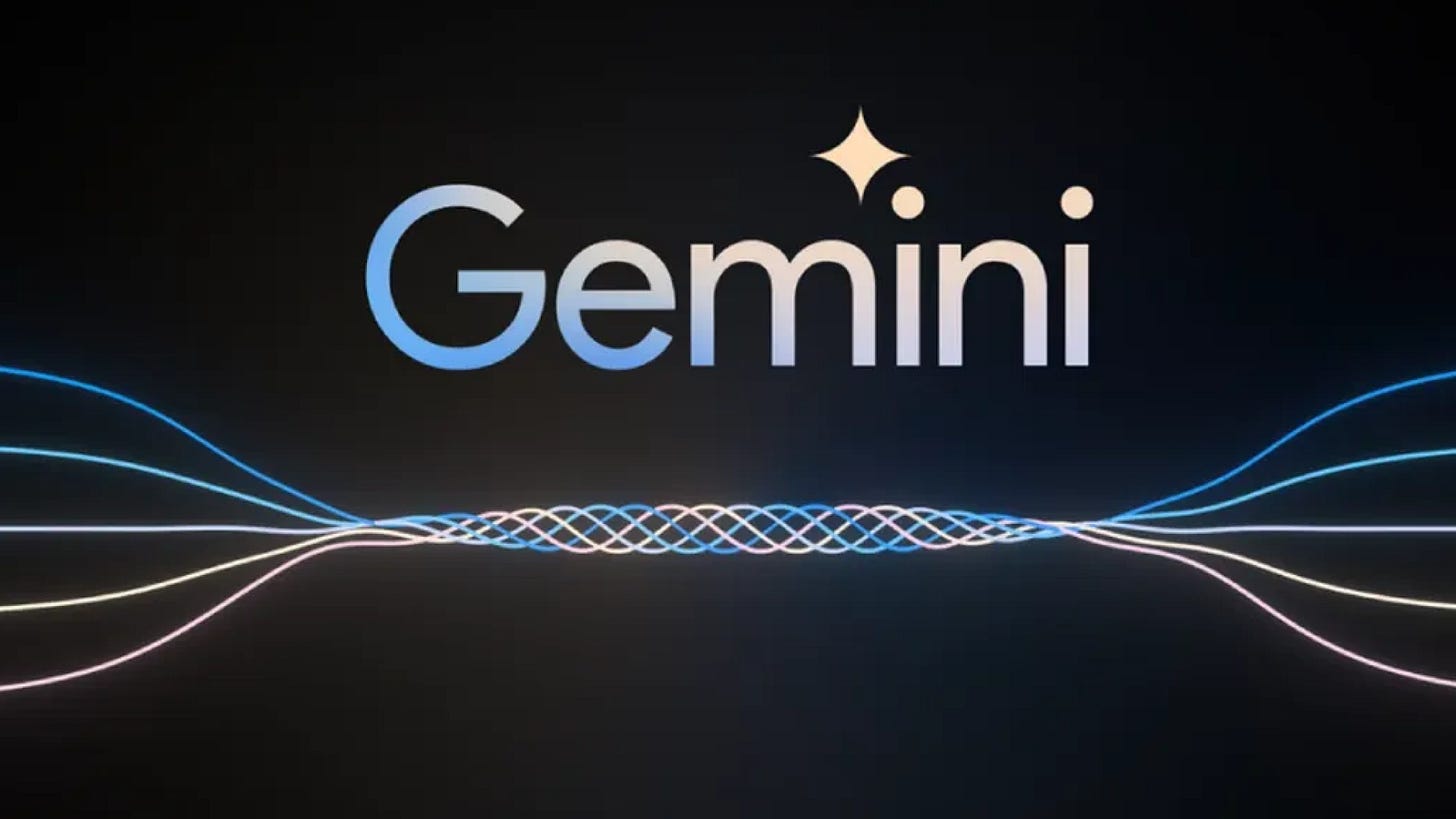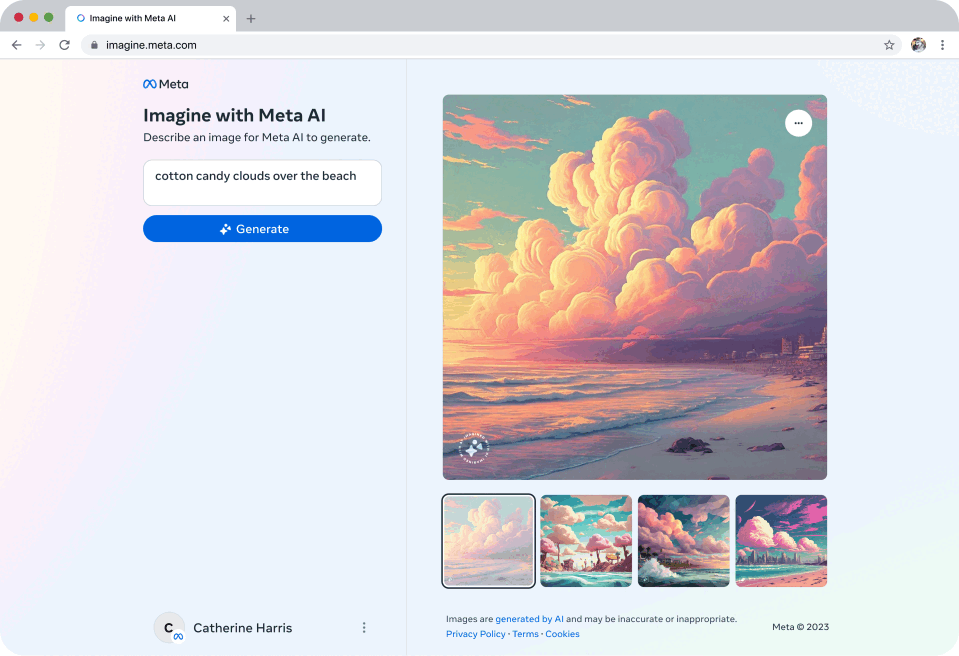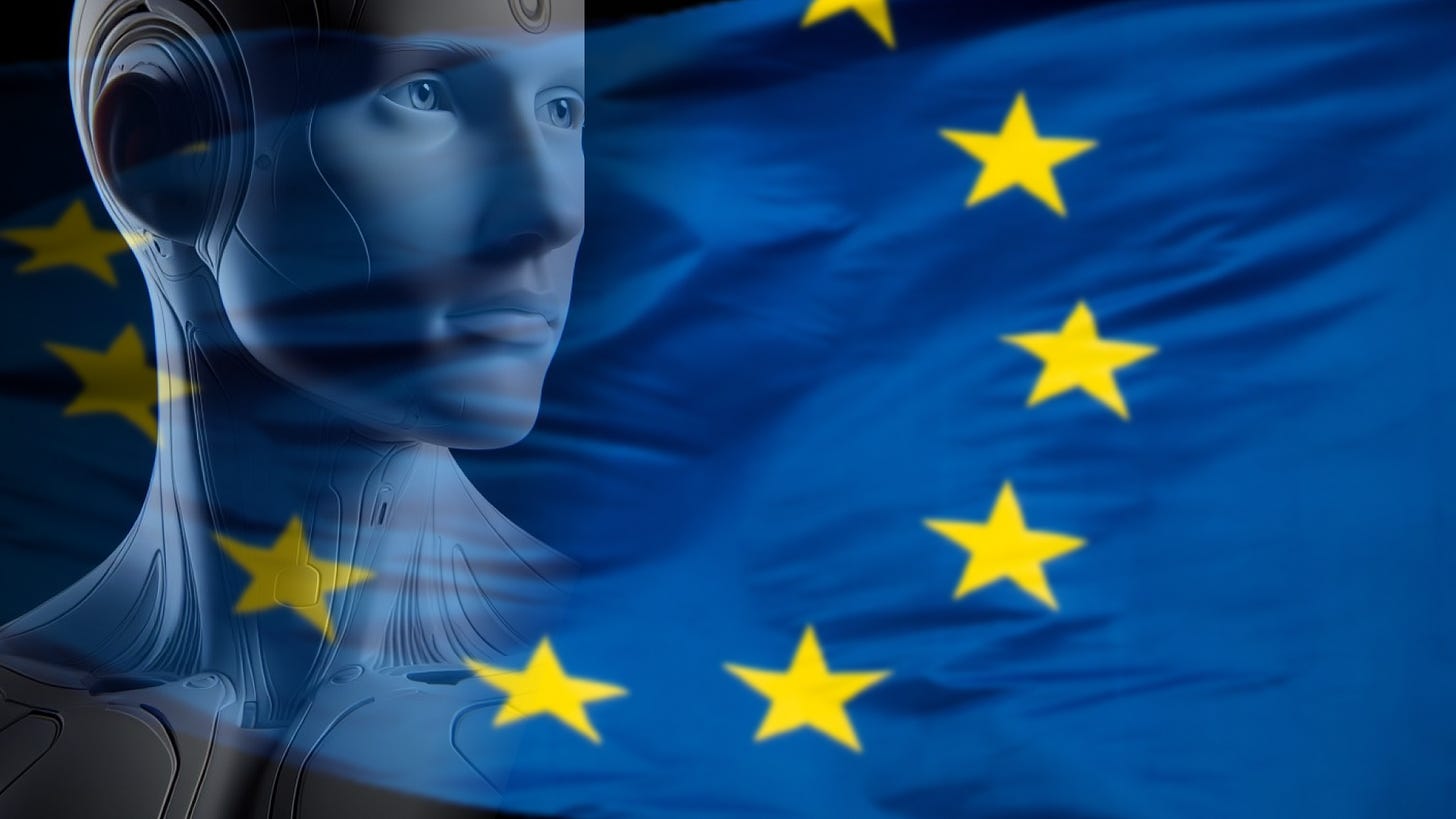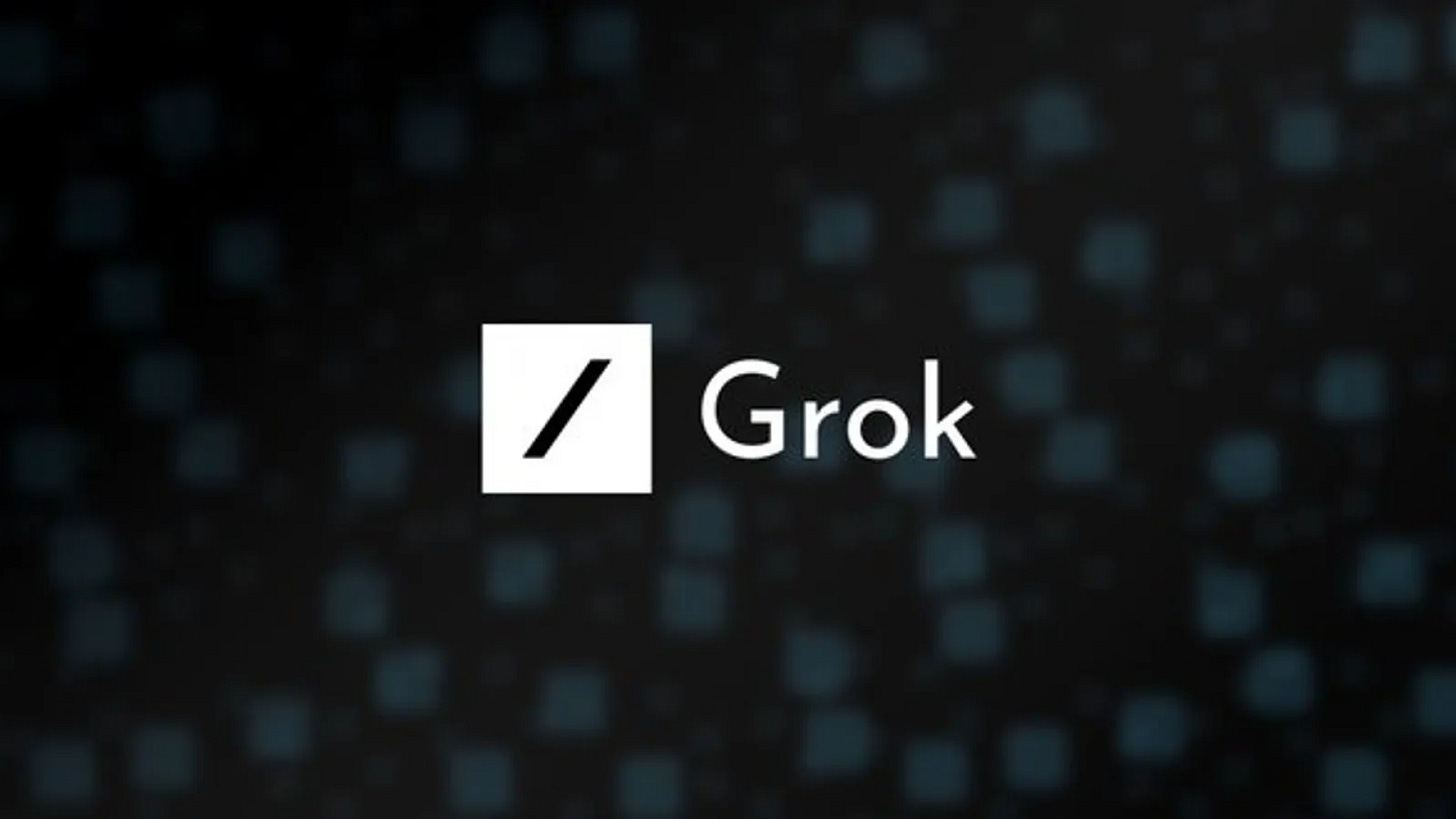NeuralByte's weekly AI rundown
Breaking news about Google, Meta, EU's AI Act and more!
Greetings fellow AI enthusiasts!
Another thrilling week has unfolded in the ever-evolving domain of artificial intelligence. Our newsletter is packed with the latest news and developments from the AI landscape.
This week's edition features groundbreaking announcements from industry giants like Google, Microsoft, and Meta, solidifying their position as pioneers in the AI revolution. Additionally, we delve into emerging AI trends, tools and many more.
🚀 Google launched Gemini, its next-gen multimodal AI model
🎨 Meta's Imagine new Image AI and more AI features
🇪🇺 World's first AI regulations: EU paves the way
🤖 Elon Musk's xAI Debuts 'Grok' AI Bot to challenge ChatGPT
✨ Alibaba's Animate Anyone animates everyone
⚔️ US military may let AI drones kill humans autonomously
👁️🗨️ Meta unveils breathtakingly lifelike codec avatars for virtual reality
🤝 Runway + Getty Images: AI powerhouse unleashes enterprise video creation
🧠 DeepMind unveils AI's ability to learn from humans in real-time
🗣️ Respeecher's ethical AI voice cloning wins new funding
🤝 Meta and IBM unite in AI alliance
And more!
Google launched Gemini next-gen multimodal AI model
The recent unveiling of Google’s Gemini AI marks a groundbreaking moment in artificial intelligence. Sundar Pichai, Google’s CEO, heralded it as the dawn of a new era, emphasizing its widespread impact across Google’s diverse product range. Gemini AI manifests in three distinct versions, each designed for specific applications. Gemini Ultra, the powerhouse, is designed for data centers and enterprise applications. Gemini Pro, now fueling Google’s Bard, promises enhanced AI services. Gemini Nano, optimized for mobile use, brings AI capabilities to Android devices, debuting with the Pixel 8 Pro.
The details:
Gemini vs GPT-4: Google claims a significant edge for Gemini over OpenAI’s GPT-4, surpassing it in 30 out of 32 benchmarks. This includes a remarkable ability to understand and interact with various data formats – a feat achieved through its pioneering multimodal approach.
Bard Advanced: Google announced a premium tier of Bard, named Bard Advanced, which will feature Gemini Ultra. This move mirrors OpenAI’s approach with ChatGPT Plus and opens up new revenue streams for Google in the AI sector.
Gemini Nano on Pixel 8 Pro: The launch of Gemini Nano on the Pixel 8 Pro marks a significant step in mobile AI. Initially, it powers advanced features like summarization in the Recorder app and smart reply in WhatsApp, signaling a shift towards more intelligent and responsive mobile applications.
AlphaCode 2: The new iteration of Google’s coding tool, AlphaCode 2, now powered by Gemini, is expected to excel in solving complex programming problems, demonstrating AI’s increasing utility in software development.
Why it’s important:
The launch of Google Gemini AI is more than just a technological advancement; it’s a strategic move that positions Google at the forefront of the AI race. As Gemini AI integrates into Google’s ecosystem, it promises to revolutionize how we interact with technology, making it more intuitive, efficient, and versatile
Meta's Imagine new Image AI and more AI features
Meta AI, the company’s generative AI experience, announced new capabilities today, including the ability to create new AI images with prompts and support for Reels. The new features aim to make Meta AI more fun, helpful and engaging for users across Facebook, Instagram and WhatsApp.
The details:
The new feature called “reimagine” allows users in group chats to recreate AI images with different prompts, using Meta AI’s image generation abilities.
Imagine is a AI generative model that can generate realistic images from text descriptions.
Users can also access Reels, the short-form video format, in Meta AI chat to see visual examples of things that match their queries, such as travel destinations or attractions.
Meta AI is also becoming more responsive and informative, by providing more detailed answers and summaries on mobile devices and a wider variety of requests.
Meta AI is powered by a large language model (LLM) that also serves other features on Meta’s platforms, such as post comment suggestions, community chat topic suggestions, search results and product copy in Shops.
Meta AI is testing more than 20 new generative AI experiences across its platforms, including those focused on search, social discovery, ads, business messaging and more.
Why it’s important:
Meta AI is part of Meta’s vision to create more immersive and interactive experiences for its users, leveraging the power of generative AI. By adding new features and capabilities to Meta AI, the company hopes to increase user engagement, satisfaction and loyalty across its platforms. Meta AI also showcases the company’s AI research and innovation, as it aims to be a leader in the field of AI.
World's first AI regulations: EU paves the way
The EU has reached a historic agreement on new laws to govern artificial intelligence, putting it ahead of the US, China and the UK in the race to regulate the rapidly developing technology. The laws will cover issues such as foundation models, AI-driven surveillance, and potential threats to life from AI. The agreement was hailed as a launchpad for EU startups and researchers to lead the global AI race.
The details:
The EU’s AI Act is the first of its kind in the world, setting clear rules for the use and development of AI in a human-centric direction.
The agreement was reached after a marathon 37-hour negotiation between the European Parliament and EU member states, following four years of debate and consultation.
The laws will address the challenges and risks posed by AI, such as bias, discrimination, privacy, security, and accountability.
The laws will also promote innovation and competitiveness in the EU’s AI sector, by creating a level playing field and fostering trust among consumers and businesses.
The laws will not take effect until 2025 at the earliest, after a formal approval process and a transition period.
Why it’s important:
AI is one of the most transformative and disruptive technologies of our time, with enormous potential to improve lives, boost productivity, and solve global challenges. However, AI also poses significant ethical, social, and legal challenges, such as the impact on human dignity, autonomy, and democracy. The EU’s AI Act aims to balance the benefits and risks of AI, by ensuring that it is used in a responsible, safe, and trustworthy manner. The EU’s AI Act could also set a powerful example for other governments and regions, as well as influence the global standards and norms for AI.
Elon Musk's xAI Debuts 'Grok' AI Bot to challenge ChatGPT
Elon Musk has unveiled Grok, an AI chatbot with a “rebellious streak” inspired by The Hitchhiker’s Guide to the Galaxy. The chatbot, developed by Musk’s AI startup xAI, is powered by a large language model called Grok-1, which claims to surpass ChatGPT on some benchmarks. Grok is now available to Premium+ subscribers on X, the social media platform formerly known as Twitter.
The details:
Grok is designed to answer questions with a bit of wit and sarcasm, and has access to user posts on X.
Grok is modeled after The Hitchhiker’s Guide to the Galaxy, a cult sci-fi comedy by British author Douglas Adams.
Grok is the first product of xAI, Musk’s new AI company that aims to create artificial general intelligence (AGI).
Grok is currently in early testing and not open to the general public. It will be released to X’s top-tier subscription service, Premium+.
Why it’s important:
Grok is a bold attempt by Musk to challenge ChatGPT, the dominant AI chatbot in the market. It also showcases Musk’s vision of creating AI that is not only intelligent, but also humorous and rebellious. Grok could potentially attract more users to X, which is struggling to compete with other social media platforms.
Alibaba's Animate Anyone animates everyone
The technique, called Animate Anyone, is a big improvement over previous image-to-video systems, as it preserves more details and produces fewer artifacts. The framework, can animate arbitrary characters and achieve state-of-the-art results in character animation, fashion video, and human dance synthesis
The details:
Animate Anyone extracts facial features, patterns and pose from a reference image, and then maps them onto different poses from a source video.
The technique uses a novel intermediate step that learns the relationship with the reference image in a consistent feature space, improving the appearance preservation.
The technique can handle various poses and movements, but still struggles with eyes and hands, which are challenging for generative models.
The technique is not yet publicly available, but the developers say they intend to provide access to both the demo and the source code.
Why it’s important:
Character animation is a challenging task that requires preserving the consistency and controllability of the character’s appearance and motion. Animate Anyone leverages the power of diffusion models and introduces novel components and techniques to address these challenges. The framework can generate realistic and diverse character videos that can be used for various applications, such as entertainment, education, art, and more While this can have positive applications, such as entertainment and education, it also raises ethical and social concerns, such as privacy and misinformation. As AI becomes more capable of manipulating reality, we need to be more vigilant and critical of what we see online.
US military may let AI drones kill humans autonomously
A recent report reveals that several countries are developing and deploying artificial intelligence-powered drones that can autonomously decide whether to kill human targets.
The report warns that these lethal autonomous weapons, also known as “killer robots”, pose serious ethical, legal, and security challenges, and calls for a binding resolution to restrict their use.
The details:
The United States, Israel, and China are among the countries that are pursuing AI-powered drones that can select and attack targets without human intervention.
The Pentagon plans to deploy thousands of AI-controlled drones by 2026 to counter China’s military advantage, and argues that human supervision is not feasible in fast-paced combat situations.
Several governments, including Austria, Brazil, and Mexico, are lobbying the United Nations to pass a binding resolution that would ban or limit the use of AI killer drones, but they face resistance from other nations that prefer a non-binding resolution.
Ukraine has reportedly deployed AI-powered drones in its conflict with Russia, but it is unclear whether they have caused any human casualties.
Critics of AI killer drones fear that they could violate international humanitarian law, lower the threshold for war, and increase the risk of accidental or unauthorized killings.
Why it’s important:
AI-powered drones that can kill human targets are becoming a reality that could have profound implications for the future of warfare and human rights. The development and deployment of these weapons raise complex moral and legal questions that need to be addressed by the international community before it is too late.
Meta unveils breathtakingly lifelike codec avatars for virtual reality
Researchers from Facebook Reality Labs have developed a method to build high-fidelity relightable head avatars that can be animated to generate novel expressions. The method, called Relightable Gaussian Codec Avatars, uses 3D Gaussians to capture fine details of human heads and a novel appearance model to support diverse materials and real-time relighting.
Runway + Getty Images: AI powerhouse unleashes enterprise video creation
Runway ML, a video AI startup based in New York City, has announced a partnership with Getty Images, one of the world’s leading visual media companies, to create a pioneering generative AI video model called Runway Getty Images Model (RGM).
The model will allow businesses to generate customized video content using AI and Getty Images assets. The partnership with Getty Images gives Runway ML access to a vast library of images and content, which is crucial for improving the accuracy and functionality of their AI models. Runway ML’s partnership with Getty Images is a significant milestone for the field of generative video AI.
DeepMind unveils AI's ability to learn from humans in real-time
A team of AI researchers at Google’s DeepMind project have developed a type of AI system that is able to demonstrate social learning capabilities. In their paper published in the journal Nature Communications, the group describes how they developed an AI application that showed it was able to learn new skills in a virtual world by copying the actions of an implanted “expert.”
This research demonstrates the potential of social learning for AI systems, which could enable them to acquire complex skills and behaviors more efficiently and robustly. Social learning is also a key aspect of human intelligence and culture, and could pave the way for more natural and collaborative interactions between humans and AI agents.
Respeecher's ethical AI voice cloning wins new funding
Respeecher is a Ukrainian startup that uses AI to modify the speech of actors, creating realistic voice models of celebrities, historical figures, or fictional characters. The company has worked with Disney, Warner Music, and CD Projekt, among others, to recreate voices such as Luke Skywalker, Edith Piaf, and Geralt of Rivia.
The company uses voice models to enhance the speech of actors, who are doing their own best to mimic the voice or character in question. This way, the voice is not simply generated, but more like a prosthetic voice. Respeecher also does accent changing, which can help actors reduce or adopt an accent.
Respeecher has also entered the medical field, helping people who have lost their voice due to laryngectomy or other conditions to communicate in a more natural way in their own voice.
Respeecher is a pioneer in the field of synthetic voice technology, which has many applications and implications for the media and gaming industry, as well as for people who need voice assistance. The company is also a testament to the resilience and innovation of Ukrainian startups, despite the challenges and conflicts they face.
Meta and IBM unite in AI alliance
Meta, formerly known as Facebook, and IBM have announced a new initiative called the AI Alliance, which aims to support open innovation and science in the field of artificial intelligence. The AI Alliance will bring together researchers, developers, companies, and other stakeholders from various industries and domains to collaborate on advancing AI trust, safety, security, diversity, and competitiveness. The AI Alliance has over 45 founding members, including AMD, Intel, CERN, Yale, Sony, ServiceNow, NASA, Oracle, Dell, and many others.
The AI Alliance is an ambitious effort to create a global platform for open and collaborative innovation in AI, and to address the technical, ethical, and social challenges that AI poses.
Quick news
StableLM Zephyr 3B is a 3 billion parameter Large Language Model (LLM), 60% smaller than 7B models (link)
McDonald’s will use Google AI to make sure your fries are fresh (link)
Thanks to AI we know that Sperm whales have equivalents to human vowels. (link)
Google’s AI-assisted NotebookLM note-taking app is now open to users in the US (link)
Microsoft Copilot celebrates the first year with significant new innovations (link)
OpenAI’s $51M chip deal with Altman-backed startup (link)
IBM introduces next-gen Quantum Processor & Quantum System Two (link)
AMD stock spikes after company launches AI chip to rival Nvidia (link)
Be better with AI
In this section, we will provide you with comprehensive tutorials, practical tips, ingenious tricks, and insightful strategies for effectively employing a diverse range of AI tools.
ChatGPT gives longer responses if you 'tip it $200,' according to one user (link)
31 AI Prompts better than “Rewrite” (link)
Tools
🎙️ Dubbing AI - Free Real Time AI Voice Changer (link)
😊 Aragorn - Create stunning realistic AI photos of yourself (link)
🎥 Descript - Transcribe speech from video or podcast. (link)
🗣️ Seamless - Create translations that follow your speech style (link)
🖼️ Playground - Cool image genaration tool (link)
📱 Runaway - Next era of art, entertainment and human creativity. (link)
📹 Short Generator - Turn Your Ideas into Engaging Short Videos in Minutes (link)
📑 Papermark AI - Platform revolutionizing document sharing and collaboration (link)
💼 Amazon Q - Designed for work that can be tailored to your business (link)
💬 Chatbase - Build a custom GPT, embed it on your website (link)
🎓 Learniverse - Harness AI to curate tutorials for your unique goals. (link)
We hope you enjoy this newsletter!
Please feel free to share it with your friends and colleagues.
Thank you for reading!







